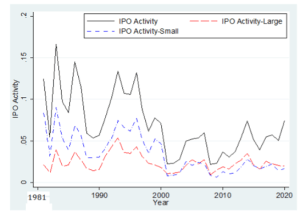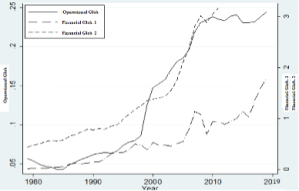Initial public offerings (IPOs) play a vital role in facilitating capital formation and wealth distribution within an economy. The decline and low number of U.S. IPOs over the past 25 years have raised concerns among entrepreneurs, investors, and policymakers. The slow IPO market has partly contributed to the rise of a “listing gap,” meaning that there are fewer publicly listed firms than expected based on the size of the U.S. economy. In a new paper, we examine the role of globalization in the decline of U.S. IPOs and shed light on the increased importance of economies of scale and scope in a more globalized economy.
Firms pursue IPOs to raise capital for growth and to provide an exit route for early-stage investors. Meanwhile, private firms often use a trade sale, a merger with an established firm, or a sale to a private equity (PE) or venture capital (VC) fund as an alternative to an IPO. One often cited reason for the slow IPO activity in the U.S. is the increased importance of the economies of scale and scope for U.S. firms – it has become more important for a business to grow big fast and to reach a large audience quickly. This argument suggests that merging with an established firm can be more beneficial than an IPO.
A private firm’s choice between an IPO and a merger can influence the aggregate IPO activity and so the number of listed firms on stock exchanges. Figure 1 reveals that this decline in IPO activity has been more severe for smaller firms than for larger ones, suggesting that the trade-off between an IPO and a trade sale is a factor in the decline of IPO activities.
Figure 1: IPO Activity in the U.S.
One reason for the increased importance of economies of scale and scope is the decline in communication and transportation costs. However, the literature does not offer much insight into how this trend can affect firms differently. Furthermore, the product and financial markets have grown more globally integrated in the past two decades. Yet, existing IPO research has predominantly focused on the influence of financial globalization in explaining the decline of IPOs. In our paper, we fill these gaps and argue that operational globalization captures one important fundamental change in doing business in the 21st century. We develop a novel measure to capture the operational aspect of globalization, encompassing the integration of global goods and services markets. Using this measure, our study aims to provide new insights into U.S. IPO activity.
Globalization has allowed domestic firms to realize economies of scale and scope by combining their resources with firms along the supply chain and across locations. This need to expand their global footprint will create winners and losers in the products and financial markets. Nascent and small private firms will benefit if they combine their resources with mature and larger firms that have global business operations. Consequently, larger firms will acquire a significant number of these smaller firms, and the universe of private firms that could become potential IPO candidates will shrink. This phenomenon will manifest as a decline in domestic IPO activity at the aggregate macroeconomy and industry levels.
Our novel measure of operational globalization uses segment-level sales data of U.S.-listed firms at the macroeconomy and industry levels. Using foreign sales ensures we can distinctly measure operational rather than financial globalization. Although financial globalization has improved access to capital markets for firms in less developed markets, the effects of global business operations on domestic capital markets remain unanswered. Figure 2 shows that significant changes to operational globalization measured using foreign sales precede financial globalization at the U.S. macroeconomy level. Furthermore, our measure for operational globalization varies across industries. This feature is a key advantage of our measure over alternatives since globalization varies significantly over time and across industries (not shown here).
Figure 2: Operational vs Financial Globalization
In our empirical analysis, we first examine the evidence at the aggregate macroeconomy and industry level and subsequently look at the choice between a merger and an IPO at the firm level. We find that an increase in operational globalization is associated with a decrease in domestic IPO activity at the macroeconomy and industry levels, particularly for small-firm IPOs. The economic and statistical significance of our results is quite substantial. A one standard deviation increase in our operational globalization measure is associated with a 40 percent decline in IPO activity. Our firm-level analysis for the choice made by private firms between an IPO and a merger indicates that an increase in globalization skews a private firm’s preference toward a merger and away from an IPO. A one standard deviation increase in globalization is associated with making private firms twice as likely to pursue mergers than IPOs.
We provide causal evidence on the role of operational globalization in domestic IPO activity by exploiting the enactment of the North American Free Trade Agreement (NAFTA) in 1994 as a quasi-exogenous shock. In addition, we use U.S. tariff rates as instrumental variables to augment the causal evidence. Our results pass through with flying colors for these tests. Thus, we conclude that the increasing importance of operational globalization has made selling out to larger acquirers more attractive for private domestic firms in the increasingly global environment. An unintended consequence has been a decline in the number of IPO candidates and, thereby, a shrinking number of listed firms on the U.S. exchanges.
This post comes to us from M. Vahid Irani at the University of South Carolina’s Darla Moore School of Business, Gerard Pinto at the University of Delaware, and Donghang Zhang at the University of South Carolina’s Darla Moore School of Business. It is based on their recent paper, “IPOs on the Decline: The Role of Globalization,” available here.
 Sky Blog
Sky Blog




